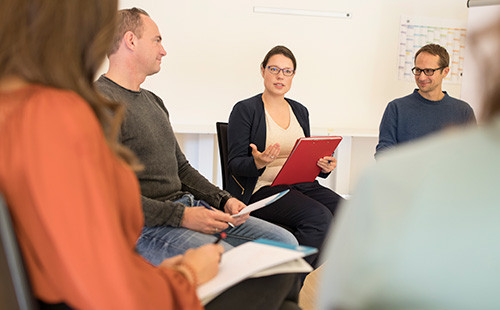Karin Heitzmann
What is poverty – and how can it be measured? Karin Heitzmann explores these questions in her research. Her work shows that poverty has many facets and comes in many different forms, even in a rich country like Austria.

Wie kann man Armut messen? | Meet…
Karin Heitzmann, head of the WU Research Institute for the Economics of Inequality (INEQ), has been conducting research into poverty for almost three decades. For the Social Report 2024 issued by the Austrian Ministry of Social Affairs, she looked at how we can make our welfare state poverty-proof, and from that she derived various recommendations for policymakers. These range from a universal job guarantee – which has also been investigated at the INEQ research institute as part of a promising pilot study – to initiating a broad-based debate on whether certain services should be seen as basic necessities and made available to all people, regardless of their income.
In the new episode of Meet Our Researchers, Karin Heitzmann explains the different ways in which poverty can be defined – and tells us how many people are affected by poverty in Austria. During a brief visit to her office in the D4 building, we also found out what drives her research, what she is currently working on, and what her favorite places are for spending time on Campus WU.
![[Translate to English:] Foto von Karin Heitzmann vor dem INEQ Institut](/fileadmin/wu/_processed_/1/0/csm_karinheitzmann1_d6b954b8b3.jpg)
Karin Heitzmann standing in front of the WU Research Institute for the Economics of Inequality, which she has been the head of since 2015: “I enjoy the dynamic spirit of my young colleagues there, who are bubbling over with ideas: That’s infectious!”
The topic of poverty is a constant in your work as a researcher. What is it that fascinates you about this topic?
During my training, I studied social policy, and poverty is a core area of social policy research. The existence of poverty also says something about the quality and effectiveness of a given social system. Our failure to curb absolute and relative poverty shows that there are some gaps in our social system. After all, we live in a rich country where poverty cannot be seen as something inevitable.
What do you want to achieve with your research?
Ultimately, I want to do research that is relevant. I’m particularly interested in issues that I think aren’t understood well enough yet – this is where I feel can really make a contribution and propose measures in order to close gaps in our social system. But I also want to understand poverty better myself: Who is at risk of poverty, and why? What are the cause-and-effect relationships? Which lifestyles and biographical risk factors lead to poverty, and how is this passed down through generations? I simply have a personal interest in finding answers to all these questions. I’m just curious, like any researcher.
What have you accomplished through your work?
In Austrian poverty research, we have helped to shed a little more light on who is affected by poverty and why. I often work with colleagues in mixed-methods settings to look behind the bare numbers. I can say, with a bit of immodesty, that I’m good at explaining these complexities in a clear and understandable way to audiences outside the scientific community: public authorities, politicians, social organizations, but also the people affected by poverty themselves and society as a whole.
![[Translate to English:] Bücherstapel in Karin Heitzmanns Büro](/fileadmin/wu/_processed_/0/c/csm_karinheitzmann2_bb7575d722.jpg)
A pile of books in Karin Heitzmann’s office: Currently, she is working on a new edition of a textbook on social policy and is well stocked with reading material.
What are you currently working on?
For one, I’m currently working with my colleagues August Österle and Christoph Badelt to prepare a new edition of “Grundzüge der Sozialpolitik,” our textbook on social policy. We’ll also be using this book in the new specialization “Social Security and Welfare Systems” within the Economy, Environment, Policy major of the Bachelor’s Program in Business, Economics and Social Sciences, starting next summer semester. Apart from that, I’m also working on articles dealing with poverty in specific types of families. Another one of my current projects is about how we can better represent the multidimensional character of poverty. And then there’s a project I’m particularly looking forward to, which is about time poverty. We’re conducting an analysis of the current time use survey. I’ll be working with colleagues to look at how time poverty correlates with other forms of poverty. We’re linking the time use survey with other data sources to see how time poverty is related to income poverty, for example.
You’ve been at WU for almost 30 years. What do you particularly like about our university?
WU’s infrastructure is fantastic. I’ve seen many universities during my career, and WU is really special in this respect: As far as the rooms, the IT infrastructure, the library, and the continuing education programs are concerned, we are more than well equipped here. That’s something I really appreciate. In terms of the scope of WU’s research, one would think that it’s only logical for a business and economics university to dedicate a significant of its research activities to investigating wealth distribution in general and poverty in particular. But compared to other universities that’s pretty unusual and cannot be taken for granted. It makes us special.
Do you have a favorite spot on campus WU?
It may sound strange, but that would be my office. It’s a wonderful place to work. I also like to spend time in the INEQ premises in the D3 building, and I enjoy the dynamic spirit of my young colleagues there, who are bubbling over with ideas: That’s infectious!
![[Translate to English:] Karin Heitzmann in ihrem Büro](/fileadmin/wu/_processed_/9/8/csm_karinheitzmann3_0f7ba21ca9.jpg)
Quick facts
Name: Karin Heitzmann
Position: Head of the INEQ research institute, associate professor
Age: 54
Born in Lienz, Austria
At WU since 1995
